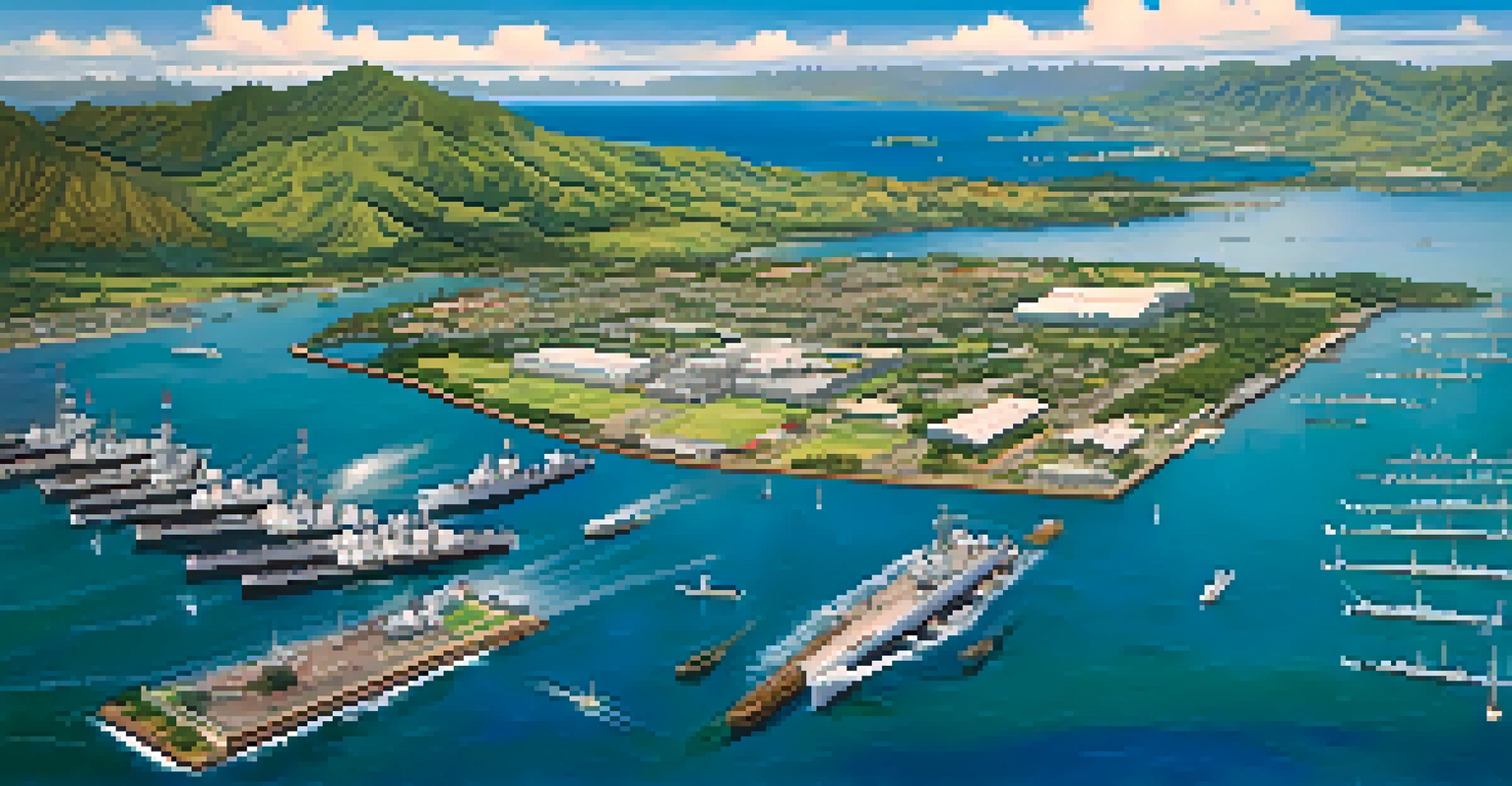Honolulu's Role in Pacific Defense: A Historical Perspective

The Early Days: Honolulu's Geographic Significance
Honolulu's location in the central Pacific made it a vital waypoint for maritime routes, especially in the 19th century. Its strategic position meant that it served as a refueling station for ships traveling between the Americas and Asia. This geographic advantage laid the groundwork for Honolulu to become a hub for both trade and military operations.
Honolulu is a strategic military location that has shaped the course of U.S. history in the Pacific.
As the U.S. expanded its influence in the Pacific, the need for a strong naval presence became clear. The establishment of the U.S. naval base at Pearl Harbor in 1887 marked the beginning of Honolulu's transformation into a military stronghold. This development not only secured American interests but also influenced international relations in the region.
The combination of natural harbor and strategic location turned Honolulu into a focal point for defense strategies. By the late 19th century, it was recognized as a key asset for the United States in its quest for power in the Pacific. This early recognition set the stage for Honolulu's continued importance in global military affairs.
World War II: Honolulu as a Defense Command Center
With the onset of World War II, Honolulu's role evolved significantly. The attack on Pearl Harbor on December 7, 1941, underscored the city's importance as a military headquarters. It became a command center for the Pacific Fleet, coordinating critical operations against Axis powers throughout the war.

The aftermath of the attack led to a significant military buildup in the region. Troops, equipment, and resources flowed into Honolulu, transforming it into a fortified bastion. This period saw an increase in military infrastructure, enhancing the city's capacity to support the war effort and protect American interests in the Pacific.
Honolulu's Strategic Military Role
Honolulu's geographic position has made it a critical hub for U.S. military operations in the Pacific since the 19th century.
Honolulu's strategic significance continued to grow as it became a launchpad for major offensives, including the liberation of various Pacific islands. The city's geographical advantages allowed for efficient mobilization of forces, which ultimately contributed to the Allied victory. This era solidified Honolulu's reputation as a vital player in Pacific defense.
Post-War Era: Honolulu's Continued Military Relevance
After World War II, Honolulu maintained its status as a key military hub. The formation of the United States Indo-Pacific Command in 1947 further emphasized the city's strategic importance in post-war military strategy. This command oversees operations across a vast area, reinforcing Honolulu's role in Pacific defense.
The military presence in Hawaii has become an integral part of the local culture and economy, fostering a unique blend of resilience and collaboration.
The Cold War era brought new challenges and opportunities for Honolulu. The city served as a critical base for monitoring communist activities in the Asia-Pacific region. This period saw an expansion of military facilities and resources, ensuring that Honolulu remained at the forefront of U.S. defense initiatives.
As global tensions shifted, Honolulu adapted to the changing landscape. The city's military presence became integral in responding to emerging threats, from regional conflicts to natural disasters. This adaptability highlights how Honolulu's legacy in defense continues to evolve in response to contemporary challenges.
Cultural Impact: The Local Community and Military Presence
The military's presence in Honolulu has significantly influenced the local culture and economy. The influx of service members and their families has created a unique blend of military and Hawaiian culture. This relationship enriches the community, fostering a spirit of resilience and collaboration.
Local businesses have thrived due to the steady flow of military personnel, leading to a thriving economy. From restaurants to retail shops, many establishments cater specifically to the needs of service members and their families. This symbiotic relationship demonstrates how military presence can bolster local economies while integrating into the cultural fabric of the community.
Cultural Impact of Military Presence
The integration of military personnel into Honolulu has enriched local culture and boosted the economy through a unique partnership.
Moreover, the local population has developed a deep respect and appreciation for the sacrifices made by military members. Events honoring veterans and active-duty personnel are common, showcasing the strong bond between the community and the armed forces. This cultural interplay continues to shape Honolulu's identity as a city that honors its military heritage.
Modernization and Technology: Honolulu's Defense Advancements
In recent years, Honolulu has embraced modernization to enhance its defense capabilities. The integration of advanced technology in military operations showcases the city's commitment to staying ahead in a rapidly changing world. From cyber defense initiatives to cutting-edge surveillance systems, Honolulu plays a crucial role in contemporary Pacific defense strategies.
The presence of research institutions and military partnerships has fostered innovation in defense technology. Collaborative efforts between the military and local universities have led to advancements in areas such as robotics and artificial intelligence. This focus on innovation not only strengthens national security but also positions Honolulu as a leader in defense technology.
As threats evolve, Honolulu's ability to adapt and innovate is vital. The city's strategic investments in modern defense systems ensure that it remains a key player in protecting U.S. interests in the Pacific. This commitment to modernization underscores Honolulu's ongoing relevance in the ever-changing landscape of global security.
Environmental Challenges: Defense and Sustainability
Honolulu faces unique environmental challenges that intersect with its defense role. Rising sea levels and climate change pose significant threats to military installations and operations. Addressing these issues is not only crucial for the local community but also for maintaining strategic military readiness.
The military has begun to incorporate sustainability practices into its operations in Honolulu. Initiatives focused on renewable energy and eco-friendly infrastructure reflect a growing awareness of environmental impacts. This shift towards sustainability demonstrates how defense strategies can align with environmental stewardship for the benefit of both military and civilian populations.
Adapting Defense to Environmental Issues
Honolulu is addressing environmental challenges while modernizing its defense strategies to ensure long-term resilience and sustainability.
As Honolulu navigates these challenges, its approach to defense and sustainability will shape future strategies. Finding a balance between military preparedness and environmental responsibility is essential for the long-term resilience of the region. This evolving dynamic highlights the importance of integrating environmental considerations into Pacific defense planning.
Future Outlook: Honolulu's Role in Pacific Defense
Looking ahead, Honolulu's role in Pacific defense will continue to be pivotal. As geopolitical tensions rise, the city's strategic location will remain a cornerstone of U.S. military operations in the region. Honolulu's adaptability and ongoing investments in defense infrastructure will be critical in addressing emerging threats.
The collaboration between military and local communities will play a significant role in shaping future defense strategies. Engaging local stakeholders in decision-making processes can enhance the effectiveness of defense initiatives. This partnership approach ensures that the interests of both the military and the community are represented.

As we move into an uncertain future, Honolulu stands ready to meet the challenges ahead. Its rich history in Pacific defense, combined with a commitment to innovation and sustainability, positions the city as a key player in shaping the future of regional security. The legacy of Honolulu in the realm of defense will undoubtedly continue to evolve.